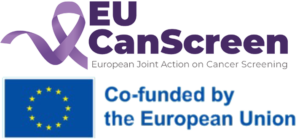Hungary, Budapest, 03.06.2025
Professional Conference on Cancer Prevention
Focus on Organized Screening and Health Communication
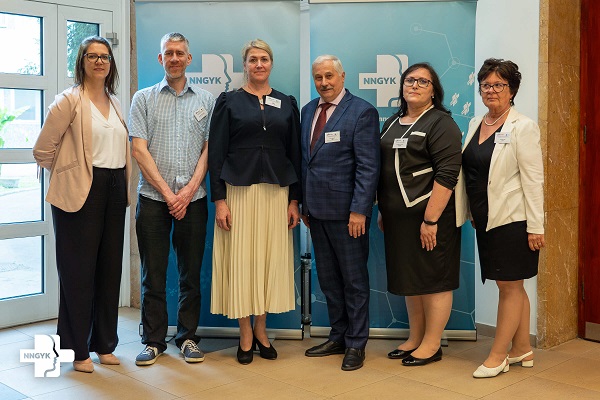
On June 3, 2025, the National Center for Public Health and Pharmacy (NNGYK) from Hungary organized a professional conference titled “Organized Screening for Public Health Purposes and Health Communication in Practice” in Budapest, Hungary, as part of the EUCanScreen project. The aim of the event was to share the latest updates on cervical, breast, and colorectal cancer screening, and to draw attention to opportunities for the prevention of these cancers.
The conference brought together professionals from various sectors in Hungary – including health visitors, medical officers, screening coordinators, civil organizations, and social sector representatives – all committed to advancing public health screening.
One of the EUCanScreen project’s objectives is to support EU member states where organized screening for breast, cervical, and colorectal cancers has not yet been implemented. It also focuses on evaluating and improving existing screening programs and expanding screening methods, all in accordance with the latest scientific evidence and international guidelines.
A key goal of the project is to develop guidelines that promote sustainability, education, health communication, and data management to help renew and improve breast, cervical, and colorectal screening programs across Europe. The project also aims to prepare and implement screening methodologies for lung, prostate, and stomach cancers, thereby reducing the burden of cancer.
Within the EUCanScreen project, NNGYK’s Screening Coordination Department, as Task 6.7 co-leader, plays an important role by focusing on health literacy improvement. As part of this task, the department developed educational materials on public health screenings and related health communication, designed to improve public awareness and increase participation in screening programs.
The event was opened by Dr. Orsolya Surján, Hungary’s Chief Medical Officer, who emphasized the key role of health communication in achieving public health goals. She also highlighted the importance of international collaboration for NNGYK, as it facilitates the exchange of best practices and mutual learning.
Following her opening remarks, Prof. Marcis Leja, Scientific Coordinator of the EUCanScreen project, addressed the audience. He emphasized that screening is one of the most powerful tools in the fight against cancer and that it can only be truly effective when accompanied by accurate and targeted communication with the population.
Mari Nygård, leader of Work Package 6, presented the epidemiological background of cancer in Europe and detailed the objectives of WP6.
Next, Renáta Bertókné Tamás, Head of NNGYK’s Screening Coordination Department, provided an overview of the current state of organized screening in Hungary and shared future plans that aim to increase population participation and improve screening rates.
Prof. Dr. Magdolna Dank, Head Director of the National Institute of Oncology, Hungary, gave a presentation on the incidence of breast cancer in Hungary and the importance of breast cancer screening. She stressed the importance of communication with patients and used mammographic images to illustrate different benign and malignant lesions in the breast.
Dr. Róbert Koiss, obstetrician-gynecologist and gynecologic oncologist, shared the latest results in the fight against HPV and cervical cancer, highlighting the synergistic effect of vaccination and screening and the significance of age-specific screening strategies.
Prof. Dr. Zoltán Szepes, gastroenterologist and Hungary’s national advisor on gastroenterology, spoke about the incidence and mortality of colorectal cancer. He provided a detailed explanation of the two-step screening process and emphasized the critical role of primary care providers in communicating about screenings.
Afternoon Session: Focus on Communication
In the afternoon, the focus shifted to communication.
Dr. Ilona Hajnalka Karácsony, associate professor, discussed the principles of health communication, emphasizing the dynamics of doctor-patient relationships and the importance of credible information delivery.
Dr. János Pilling, psychiatrist and health communication expert, presented specific techniques to improve the delivery of messages related to screenings. He used practical examples to demonstrate how these techniques can be integrated into the daily communication practices of healthcare professionals.
The event enabled participants to gain broader insights into the functioning and development of screening programs in Hungary, as well as the communication challenges and opportunities involved. Under the umbrella of health literacy, innovation, and international cooperation, the EUCanScreen project represents a significant milestone in the fight against cancer. It supports efforts to elevate prevention to a unified and sustainable level and contributes to the long-term improvement of public health standards across Europe.
Supplementary Summary:
Professional Conference on Cancer Prevention – Focus on Organized Screening and Health Communication
On June 3, 2025, the National Center for Public Health and Pharmacy (NNGYK) from Hungary organized a professional conference titled “Organized Screening for Public Health Purposes and Health Communication in Practice” in Budapest, Hungary, as part of the EUCanScreen project. One of the project’s sub-tasks, WP6 6.7, focuses specifically on improving health literacy. As part of this effort, an educational material has been developed to facilitate clear and targeted communication of information related to public health screenings, and this formed the basis of the conference’s thematic structure.
The event aimed to share the latest information on cervical, breast, and colorectal screenings and to highlight prevention opportunities for these types of cancer. The conference gathered Hungarian experts from various sectors – including healthcare, the social sphere, civil organizations, and Hungary’s public health network.
Professional presentations covered multiple aspects of cancer screening, emphasizing current challenges, opportunities to increase participation rates, and the role of communication and education in improving program effectiveness.
Particular attention was given to health communication, which plays a fundamental role in ensuring that screening programs reach a wider segment of the population. The afternoon session was dedicated to exploring both theoretical and practical elements of communication, introducing techniques and methods easily applicable in everyday healthcare practice.
The event provided an opportunity for attendees to gain a comprehensive understanding of current issues in cancer screening in Hungary and deepen their knowledge in the field of health communication.
#EUCanScreen
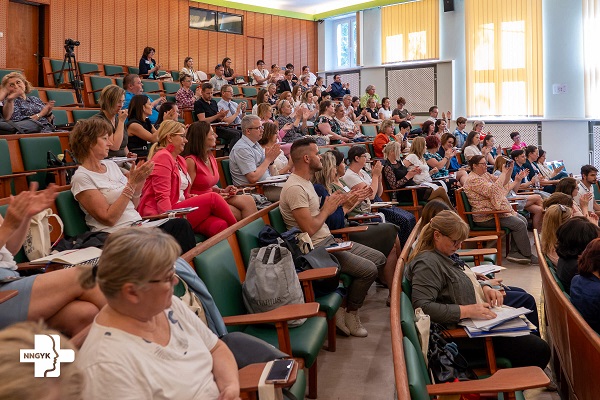
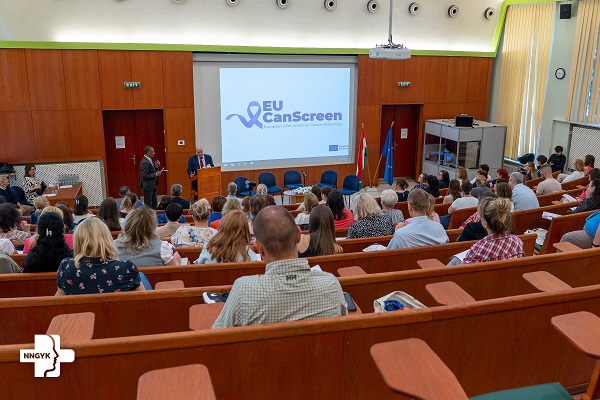
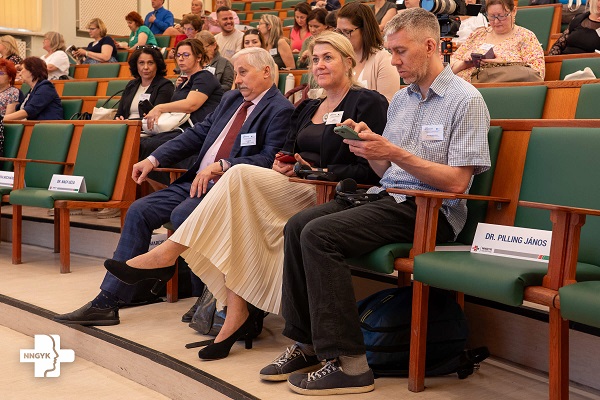
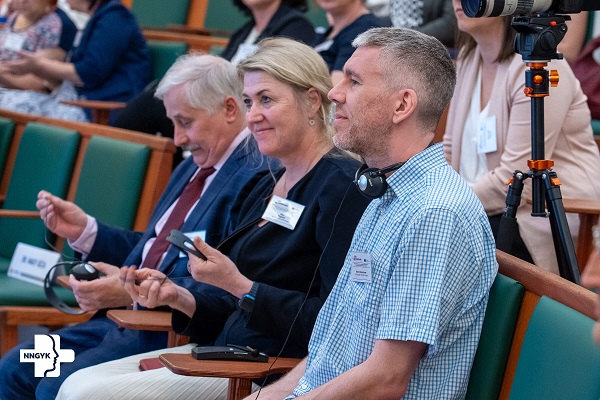
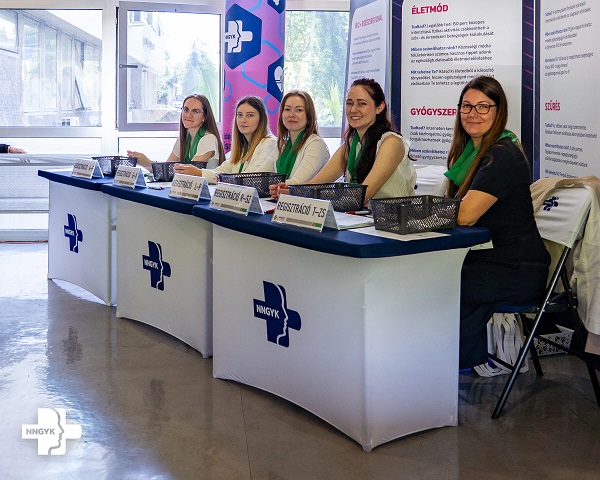
Subscribe to our newsletter to get news and updates.
Subscribe to our newsletter to get news and updates.

The general objective of EUCanScreen is to assure sustainable implementation of high-quality screening for breast, cervical and colorectal cancers, as well as implementation of the recently recommended screening programs – for lung, prostate and gastric cancers. EUCanScreen will facilitate the reduction of cancer burden and achieving equity across the EU.
This project has received funding from the European Union’s EU4HEALTH Programme under the Grant Agreement no 101162959

